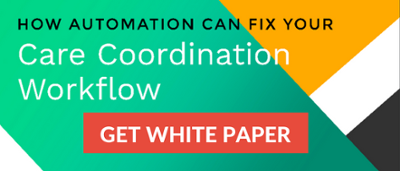
As value-based care takes center stage in healthcare, primary care providers (PCPs) and specialists must find ways to eliminate communication deficiencies and share information more effectively to ensure a more well-rounded and positive patient experience. Strong quality scores, efficient operations, and credible customer service are no longer just admirable traits of a positive care coordination environment; they’re quickly becoming characteristics that define whether primary care succeeds or falls short in value-based care.
Closing Care Gaps with Accountability
Accountable referral networks allow providers to effectively close care gaps, giving primary care providers easy access to their patients’ journeys beyond their initial visits. With a proper system in place, physicians will know if their patients received treatment. If so, they will be able to determine where, when, and how the treatment was administered.
[DOWNLOAD] The ultimate guide to coordinating care with better workflows
Empowering Modern Workflow with Technology
Establishing an effective referral network, or improving a flawed one, relies on bolstering technology, streamlining efficiency, and eliminating cumbersome manual work or incomplete information exchange (and, as a result, worse care and open loops). Your workflows should be automated wherever possible, with ease of use and transparency helping providers to communicate better about the needs of patients – and ensure that patients actually get recommended, necessary care.
Technology must be utilized to its fullest to promote better healthcare. Manual processes are subject to human error and often require countless hours on the phone to chase down information, which would only take seconds to obtain if the processes were automated. According to an MGMA report, medical receptionists can waste up to 30 minutes on the phone when a patient’s information is not close at hand. Currently, primary care practices are carrying higher-than-necessary payroll costs as they continually add full-time clinical and administrative professionals in an effort to maintain quality and compliance standards. This is not sustainable.
Conversely, technology offers a sustainable path forward – with automation, primary care practices are eliminating 70% of their previous manual processes. Automation can also open up team members’ schedules and allow operations to focus on revenue-generating activities. With care coordination technology in place, practices are able to focus more time on wellness initiatives and chronic care management to enhance their medical service offerings.
[WHITE PAPER] The ultimate guide to effective referral networks
EHRs Won’t Fix Care Care Coordination
Naturally, EHRs were an important part of the technological evolution in the healthcare industry; however, EHRs are not magic pills, and they will not fix care coordination. In fact, John Halamka, CIO of Beth Israel Deaconess Medical Center, said at the HIMSS conference in March 2016 that “It would be easier to coordinate team-based medical care on facebook rather than with EHR systems.” Much of the problem is that PCPs treat direct secure messaging (DSM) as a way to close and manage referral loops. In fact, they’re merely able to transfer minimal information without being a truly sustainable solution for closing the loop on referral orders. Our May blog has more information on the limitations of EHRs.
Without reporting and analytic capabilities, or a complete data flow from PCPs to specialists, EHRs are simply unable to streamline patients’ journeys. Instead, providers need an electronic referral network to achieve optimally coordinated care and close the loop on a high percentage of referrals.
For more information on implementing effective automation and improving care coordination on behalf of your patients, feel free to check out our free resource, or schedule a consultation with our health strategist for an assessment of your current processes.


